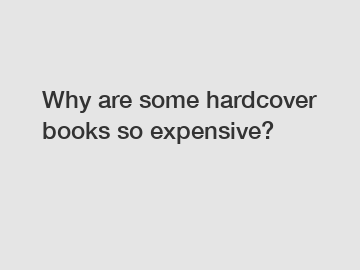Why are some hardcover books so expensive?
Books have always been treasured possessions, providing an escape into worlds unknown and expanding our intellectual horizons. Among the different types of books available, hardcover editions have a reputation for being more costly than their paperback counterparts. But have you ever wondered why this is the case? In this blog, we will explore the factors that contribute to the higher price of hardcover books, shedding light on the fascinating world of book publishing and pricing.
1. Quality and Durability.
One of the primary reasons hardcover books come with a higher price tag is their superior quality and durability. Unlike paperbacks, hardcovers are constructed with sturdier materials, such as thick cardboard and cloth or leather covers. The hardcover binding offers protection against wear and tear, ensuring the book's longevity. Investing in a hardcover edition means you'll have a literary companion that will stand the test of time.

2. Production Costs.
Behind every book lies a complex production process involving numerous professionals, from authors and editors to designers and illustrators. Hardcover books require additional attention to detail during production. The materials used, such as high-quality paper, ink, and cover materials, contribute to the overall expense. Furthermore, hardcovers often feature dust jackets, decorative elements, and embossed titles, further adding to their production costs.
3. Lower Printing Volume.
Publishers often print hardcover editions in smaller quantities compared to paperbacks. While paperbacks are mass-produced due to their affordability and popularity, hardcovers cater to a niche market of readers who value the luxurious experience of owning a physical book. Consequently, the lower printing volume drives up the cost per unit, making hardcover books more expensive.
4. Exclusive Content and Features.
Hardcover editions often offer additional features that enhance the reading experience. Exclusive content, such as author interviews, illustrations, maps, or even collectible bookmarks, adds value to the book. These extras are absent in paperbacks, making hardcovers more appealing to avid fans or collectors willing to pay a premium for the exclusive content and unique aesthetic presentation.
5. Desirability and Prestige.
Hardcover editions carry a certain allure and prestige, often associated with timeless classics or highly anticipated new releases. Owning a hardcover book signals discerning taste and an appreciation for the written word. For many book lovers, hardcovers are coveted possessions, creating a sense of pride when displayed on bookshelves. The desirability and prestige surrounding hardcover books contribute to their elevated price point.
6. Cost of Shelf Space.
While e-books have revolutionized the publishing industry, physical books still occupy a significant market share. Bookstore shelves are valuable real estate, and the mere display of hardcover books costs more than that of paperbacks due to their larger size and weight. The additional expense incurred by bookstores is passed on to consumers, further contributing to the higher prices of hardcovers.
7. Limited Editions and Fine Printing.
Limited edition hardcover books are often printed in even smaller quantities, making them highly sought after by collectors. These editions may feature special bindings, customized illustrations, or even be signed by the author. The exclusivity and scarcity of limited editions inherently increase their value and justify the elevated price.
Conclusion.
Hardcover books offer a tangible experience that immerses readers in the tactile pleasure of reading. However, their higher price compared to paperbacks may cause some to question their worth. Yet, when considering the quality, durability, and overall luxurious experience that hardcovers provide, it becomes clear why they demand a higher price. The production costs, limited printing volume, exclusive content, desirability, cost of shelf space, and limited editions all contribute to the elevated price of hardcovers. So next time you pick up a hardcover book, remember that you're not just paying for a story, but for a lasting treasure worthy of your literary collection.
If you want to learn more, please visit our website linen hardcover book printing, linen covers hardcover book, luxury coffee table book printing.

Comments